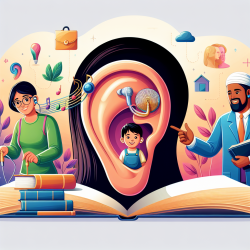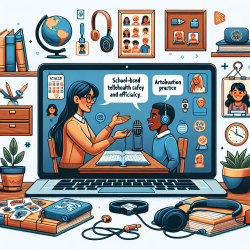The evolution of cochlear implants has been a beacon of hope for many, promising significant advancements in the rehabilitation of individuals with hearing impairments. However, as we navigate through the excitement and possibilities, it's crucial for practitioners to ground their expectations and methodologies in research and evidence-based practices. The commentary on "Future Directions for Cochlear Implants" by Richard S. Tyler and colleagues provides a compelling overview of the challenges and potential pathways for enhancing the impact of cochlear implants.
One of the key takeaways for practitioners is the emphasis on creating an enriched auditory educational environment. This involves not just the technological aspects of cochlear implants but also the comprehensive support system surrounding the recipient. Tyler and his team highlight the importance of auditory training and speech therapy, tailored to develop specific skills that maximize the child's new auditory potential. This calls for a curriculum that integrates auditory training with speech development, focusing on discrimination at the word or sentence level.
However, the commentary also cautions against narrowly focusing on "splinter skills" without considering the holistic development of the child. It suggests that an approach promoting integrated learning, where auditory training is complemented by engaging, real-life communication, is more beneficial. This aligns with the broader perspective that language and speech are best learned through dynamic interaction with family, friends, and educators, making the human contribution indispensable.
Another future direction underscored is the potential of computer-based aural rehabilitation. While initially met with skepticism, the integration of game technology and innovative programming offers an efficient supplement to traditional therapy methods. This approach can motivate both children and adults to improve their perceptual skills through engaging and interactive exercises.
For practitioners, the commentary underscores the importance of continuous professional development and parent education. The successful implementation of cochlear implants requires a collaborative effort, ensuring that families and educators are well-informed and supported throughout the process. This collaborative approach extends beyond the technical fitting of the device, encompassing the emotional and psychological support needed to navigate the journey of auditory rehabilitation.
In conclusion, the future of cochlear implants lies not only in technological advancements but also in the holistic support system that surrounds the recipient. Practitioners are encouraged to embrace a multidisciplinary approach, integrating evidence-based auditory training, speech therapy, and aural rehabilitation strategies. By doing so, we can maximize the potential of cochlear implants, offering individuals with hearing impairments a brighter, more sound-filled future.
To read the original research paper, please follow this link: Peer Commentary on "Future Directions for Cochlear Implants".










